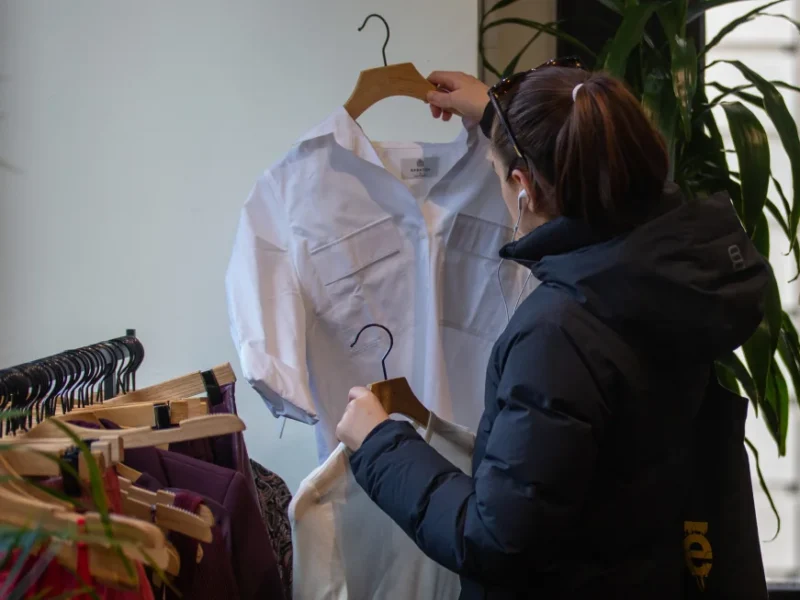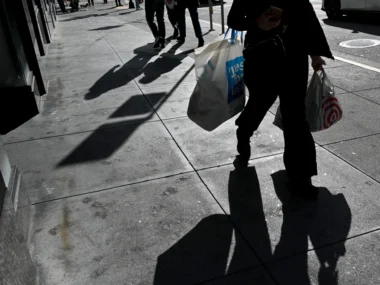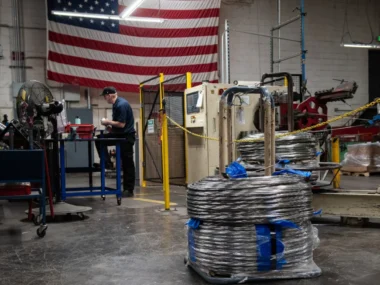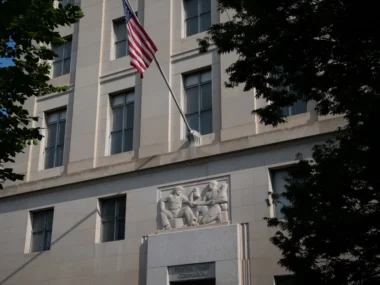US retail spending dropped significantly more than anticipated in January, with harsh weather conditions across the United States deterring shoppers following a strong holiday spending season.
The Commerce Department reported on Thursday that retail sales, encompassing spending on all goods and food services, decreased by 0.8% in January, breaking a two-month streak of increases. This figure was even lower than the downwardly revised 0.4% increase in December and well below economists’ expectations of a 0.1% decline, as per FactSet. These figures are adjusted for seasonal fluctuations but not inflation.
Spending declined across various sectors last month, including at gas stations and home improvement stores, which saw decreases of 1.7% and 4.1%, respectively, likely due to the cold weather. Online sales also contracted by 0.8%. Conversely, sales at restaurants and bars increased by 0.7% in January.
Americans are feeling the pressure from elevated interest rates, persistently high inflation, and greater difficulty accessing credit, as many continue to deplete their pandemic savings. However, one significant positive aspect is that the job market remains relatively robust. Strong earnings from major technology companies have also fueled gains in the stock market, contributing to increased wealth for some Americans.
Despite the worse-than-expected report on Thursday, it marks only the second decline in retail sales over the past 10 months. Additionally, the Arctic chill experienced in January reversed later in the month in some regions, raising the possibility of a resurgence in retail spending in February.
Bill Adams, chief economist at Comerica Bank, noted that this weakness in retail spending typically reverses quickly as weather conditions return to normal and people catch up on postponed spending plans due to the cold and snow.
“The Fed is likely to overlook one month’s weak retail sales report, especially since there is a clear explanation stemming from a clearly temporary issue,” Adams stated.
While there are no glaring indications of a US recession at present, economists widely anticipate the economy to operate at a slower pace in the forthcoming months.
Businesses are indicating that US consumers are experiencing significant levels of stress.
Several major companies within the S&P 500 have indicated in recent earnings calls that there’s a growing realization of stress among Americans, which could potentially lead to a reduction in consumer spending. Given that consumer spending contributes to approximately two-thirds of economic output.
Tim Wentworth, CEO of Walgreens Boots Alliance, expressed on a recent earnings call that the state of the consumer might not be as optimistic as portrayed in some reports about consumers in general.
Americans have been maintaining their spending habits by resorting to traditional credit cards and “Buy Now, Pay Later” options, particularly among individuals with low credit scores, as noted by researchers at the New York Fed. However, borrowers will eventually need to repay this debt.
Kathy Bostjancic, chief economist at Nationwide, mentioned in a recent note that they anticipated consumers to scale back their spending this year after depleting savings accumulated during the pandemic, which had lowered the savings rate well below pre-pandemic levels, and increasingly relying on credit.
Another common behavior observed when consumers are struggling to sustain their spending is to seek better deals by opting for more cost-effective options, such as shopping at Costco and Walmart, according to Wentworth.
This trend is influenced by inflation rates that are substantially higher than the Federal Reserve’s 2% target, affecting the purchasing power of US consumers.
James Quincey, CEO of Coca-Cola, highlighted during an earnings call that a segment of the population is facing pressure on disposable income due to the inflationary effect. He emphasized the company’s focus on affordability, including adjustments in pack sizes and pricing, to address this concern.











